 1991 - 1992
1991 - 1992
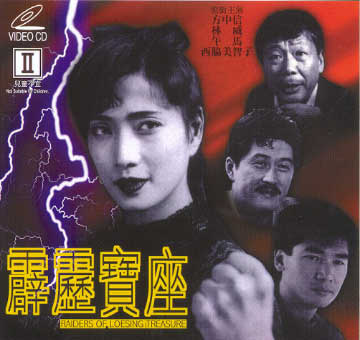
“King of Gambler” (1991)
(Eagle Film Production Co., Dir. Johnnie Kong)
A Triad gang is recruited by an unscrupulous
Japanese terrorist mastermind (Lung Fong), posing as a gambler, to assist
in a high stakes gambling match. Although ostensibly seeking to reverse
loss of face for an earlier defeat by a female American gambler with special
sensory powers, this plan is actually concerned with raising money for
a Japanese terrorist cell. The fiancé (Lin Wei) of the HK
Triad boss’s daughter (Kathy Chow) pits his special sensory powers against
the American contender, who is actually in league with the Japanese terrorists.
When his future father-in-law (Roy Chiao) is killed and fiancée
is kidnapped, he and Alex Man (the Triad boss’s son) take revenge.
 The action at levels in this film is so exaggerated
that all dramatic effect is squandered. The gambling match involves
stakes of US $700 million. The mass slaughters of the Triad family
by American gunmen at a garden party, of the gunmen in a hotel suite, and
of the neatly suited Japanese terrorists involve scything down dozens of
people in waves by machine gun fire. They literally run en masse
into the line of fire. Lack of dramatic tension renders the characters
and sub-plots so unreal that it’s hard to care about the outcome.
The action at levels in this film is so exaggerated
that all dramatic effect is squandered. The gambling match involves
stakes of US $700 million. The mass slaughters of the Triad family
by American gunmen at a garden party, of the gunmen in a hotel suite, and
of the neatly suited Japanese terrorists involve scything down dozens of
people in waves by machine gun fire. They literally run en masse
into the line of fire. Lack of dramatic tension renders the characters
and sub-plots so unreal that it’s hard to care about the outcome.
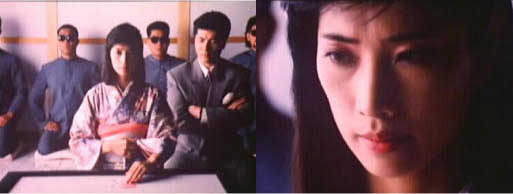 Michiko, appearing in a cameo role, breaks a sweat
as the Japanese gambler initially defeated by the American with special
powers. Unfortunately she doesn’t have much to do other than look
great in a traditional kimono. Her entire appearance is a cameo,
presented on a videotaped review of the card game.
Michiko, appearing in a cameo role, breaks a sweat
as the Japanese gambler initially defeated by the American with special
powers. Unfortunately she doesn’t have much to do other than look
great in a traditional kimono. Her entire appearance is a cameo,
presented on a videotaped review of the card game.
A1, B0, C2, D2, E2, F2 (9).
“Real Me, The” (1991)
An undercover cop (Kong Wa) on a mission to
steal incriminating computer discs from a Triad gang suffers a head injury
after a car chase and develops amnesia. He is attacked in hospital
by the Triad gang and narrowly escapes. Fleeing from both the gang
and the police, he is rescued by Michiko. She is his lover, and there
are some relatively explicit (but not graphic) sexual scenes. She
is a Japanese who works for another gang headed by her father. She
reports to his house and changes into a traditional kimono. She is
later abducted and held for ransom by the gang that is attempting to recover
the discs.
 During the second half of the film Michiko’s lover
begins to recover elements of his memory. He returns to visit his
wife (Kara Hui Ying-Hung). Later, distraught over the death of her
police officer brother (Chin Siu Ho) who is killed by the hero to preserve
his cover, she beats on him. Then they embrace – only to be discovered
by Michiko. There is a good fight scene between Michiko – who throws
several powerful roundhouse kicks – and Kara, who performs an impressive
kip. After Kara is knocked down in the road she is killed by an oncoming
truck. A hit is ordered on Michiko and her lover. In a doomed
confrontation they are outnumbered by gang members, and Michiko is shot,
dying in her lover’s arms.
During the second half of the film Michiko’s lover
begins to recover elements of his memory. He returns to visit his
wife (Kara Hui Ying-Hung). Later, distraught over the death of her
police officer brother (Chin Siu Ho) who is killed by the hero to preserve
his cover, she beats on him. Then they embrace – only to be discovered
by Michiko. There is a good fight scene between Michiko – who throws
several powerful roundhouse kicks – and Kara, who performs an impressive
kip. After Kara is knocked down in the road she is killed by an oncoming
truck. A hit is ordered on Michiko and her lover. In a doomed
confrontation they are outnumbered by gang members, and Michiko is shot,
dying in her lover’s arms.
 Michiko has considerable screen time in this film,
and several brief fight scenes. Although not one of her most striking
roles, she is nevertheless pleasing to watch.
Michiko has considerable screen time in this film,
and several brief fight scenes. Although not one of her most striking
roles, she is nevertheless pleasing to watch.

A3, B2.5, C2.5, D3, E3, F3 (17). Recommended
“Witchcraft vs. Curse”
(1991)
(Hop Chung Film [HK] Ltd.)
When an ambitious mother enlists the aid of
a sorcerer to cast a spell over a wealthy young man so that he will marry
her daughter, his suddenly abandoned fiancée seeks the assistance
of a school friend now living in Thailand. She, in turn, refers them
to a sorceress (Michiko) who engages in a spiritual contest with the sorcerer
that eventually frees the young man.
 There is a lot of relatively graphic sex throughout
this film, including an autoerotic scene in which the woman who referred
her friend to Michiko is visited by a ghost of adultery who invisibly has
intercourse with her. Michiko’s sorcery is enhanced by performing
elephants and well-endowed, semi-nude young women who alternately perform
ritual dances or sexually provoke the heroine’s fiancé while he
is in a trance.
There is a lot of relatively graphic sex throughout
this film, including an autoerotic scene in which the woman who referred
her friend to Michiko is visited by a ghost of adultery who invisibly has
intercourse with her. Michiko’s sorcery is enhanced by performing
elephants and well-endowed, semi-nude young women who alternately perform
ritual dances or sexually provoke the heroine’s fiancé while he
is in a trance.
 Although Michiko appears at her languid best,
she really just poses and does not have much overall screen time.
This is definitely a Cat. III erotic production dressed up as sorcery.
Although Michiko appears at her languid best,
she really just poses and does not have much overall screen time.
This is definitely a Cat. III erotic production dressed up as sorcery.
A2, B1.5, C2.5, D2, E2, F1 (11).
“Mighty Gambler, The”
(1992)
(Chung Ngai Movie Production Co., Dir. Wong
Chan-Yeung)
In this entertaining, fast-paced GWG movie,
Sibelle Hu plays the daughter of a casino owner who is killed in a revenge
hit. When a Japanese mob guest of hers is also killed, she fears
a takeover by a Japanese gang, headed by Alex Man. After a tense
confrontation, she appears to shoot him, but this is actually a ruse to
draw out his foster brother (Alex Fong) who is the real culprit.
 Well-choreographed fight scenes with kung fu,
guns, karate and a sword, as well as an exhilarating final confrontation
in the casino place this film among the best in the genre. The movie
is free from offensive sexuality or sexism. Throughout, whether at
the tables or during gun battles, the action is tense and crisply directed.
Although it is Sibelle Hu’s movie – one of her best roles – Michiko has
a substantial supporting part as the straight-laced Mainland cousin of
one of Sibelle Hu’s employees. She’s hired as a waiter, and participates
in several fight sequences, including with a sword-wielding female assassin.
Michiko appears well muscled, fast and powerful. Her stance and form
suggest she had been studying traditional karate styles, as well as the
sword. Although her fight scenes are brief, they are qualitatively
among her best.
Well-choreographed fight scenes with kung fu,
guns, karate and a sword, as well as an exhilarating final confrontation
in the casino place this film among the best in the genre. The movie
is free from offensive sexuality or sexism. Throughout, whether at
the tables or during gun battles, the action is tense and crisply directed.
Although it is Sibelle Hu’s movie – one of her best roles – Michiko has
a substantial supporting part as the straight-laced Mainland cousin of
one of Sibelle Hu’s employees. She’s hired as a waiter, and participates
in several fight sequences, including with a sword-wielding female assassin.
Michiko appears well muscled, fast and powerful. Her stance and form
suggest she had been studying traditional karate styles, as well as the
sword. Although her fight scenes are brief, they are qualitatively
among her best.

A2, B 4, C2.5 D3, E4, F3.5 (19). Highly
Recommended
“Passionate Killing
in the Dream” (1992)
(Dir. Parkman Wong)
Set in Thailand, the central character is an
emotionally vulnerable female fashion photographer whose vivid dreams about
a serial killer eventually provoke his unwelcome attention. Michiko’s
character “Sha-Sha Lee” is more subdued and conventional than usual.
She does a competent job as the star of this drama, effectively conveying
the terrifying destabilization caused by her nightmarish visions that eventually
become reality. Unfortunately, the depth and relative subtlety of
her performance is offset by a wholly unnecessary romance – with her psychologist!
If this had been portrayed as an inappropriate, clandestine liaison prompted
by her unraveling sanity, the film might have been considerably enhanced.
However, it seems just an excuse to subordinate the female lead to male
direction, with some travel scenes of their vacation thrown in! The
usual elements of mild farce are also distracting.
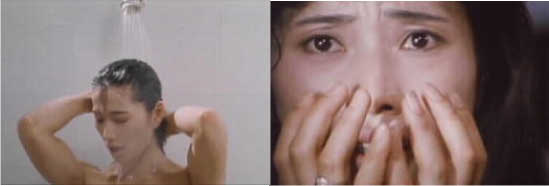 On the positive side is an unexpectedly strong
performance from the main female supporting actor who plays “Catherine,”
the director of a fashion show for which Michiko is shooting publicity
stills. Catherine is a lesbian who is pampered by her models and
assistants. She makes a play for Michiko, admiring her physique.
She’s also a proficient martial artist, and when she drunkenly persuades
Michiko to accompany her on a continuing binge in an open-air café,
Catherine quickly picks a fight with some leering young men. In one
of the film’s best scenes Michiko and she demolish the opposition, Catherine
alternately staggering and fighting. She eggs Michiko on, screaming
at her to kill the men. Sha-Sha is visibly put out, and brusquely
rejects her.
On the positive side is an unexpectedly strong
performance from the main female supporting actor who plays “Catherine,”
the director of a fashion show for which Michiko is shooting publicity
stills. Catherine is a lesbian who is pampered by her models and
assistants. She makes a play for Michiko, admiring her physique.
She’s also a proficient martial artist, and when she drunkenly persuades
Michiko to accompany her on a continuing binge in an open-air café,
Catherine quickly picks a fight with some leering young men. In one
of the film’s best scenes Michiko and she demolish the opposition, Catherine
alternately staggering and fighting. She eggs Michiko on, screaming
at her to kill the men. Sha-Sha is visibly put out, and brusquely
rejects her.
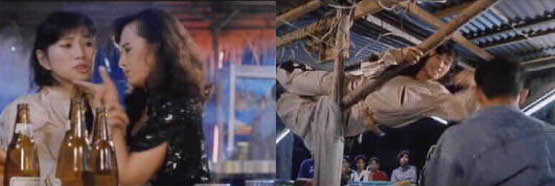 The other major pillar supporting the plot is
the serial killer, played with considerable sophistication by Gordon Liu.
Flashbacks show his childhood exposure to poverty and family violence,
as his mother’s drunken partner hurls him down the stairs of their hut.
His adult efforts to succeed as a muay Thai boxer are cut short in matches
where he is brutally beaten with tonfas. Beaten, scared, scarred,
and preoccupied with his unmet childhood needs, he develops a pattern of
savage lust murders of attractive women – especially those who reject him.
At knifepoint he courts them, leading them through a ghoulish ritual.
This portrayal is actually quite sophisticated in its interweaving of past
trauma and current preoccupation with efforts to prove self-worth.
Again, it is unfortunate that the character of the psychologist, “Alex
Ha,” was not used to more effect.
The other major pillar supporting the plot is
the serial killer, played with considerable sophistication by Gordon Liu.
Flashbacks show his childhood exposure to poverty and family violence,
as his mother’s drunken partner hurls him down the stairs of their hut.
His adult efforts to succeed as a muay Thai boxer are cut short in matches
where he is brutally beaten with tonfas. Beaten, scared, scarred,
and preoccupied with his unmet childhood needs, he develops a pattern of
savage lust murders of attractive women – especially those who reject him.
At knifepoint he courts them, leading them through a ghoulish ritual.
This portrayal is actually quite sophisticated in its interweaving of past
trauma and current preoccupation with efforts to prove self-worth.
Again, it is unfortunate that the character of the psychologist, “Alex
Ha,” was not used to more effect.
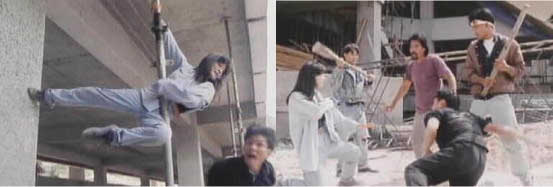 As Sha-Sha attempts to visualize the killer in
her waking state, her efforts are cynically revealed by the police in an
effort to lure the killer out. He obliges, and confronts Michiko
at her home after she has taken a sleeping pill – thanks to the psychologist’s
suggestion. She’d have been a lot better off without him! This
fight is extremely well done, blending the killer’s ritual and Michiko’s
sedative-impaired efforts to disrupt it. The distinctive musical
melody that forms part of the killer’s routine as he dances with his terrified
victims remains vivid long after the final credits. This is definitely
one of Michiko’s strongest parts.
As Sha-Sha attempts to visualize the killer in
her waking state, her efforts are cynically revealed by the police in an
effort to lure the killer out. He obliges, and confronts Michiko
at her home after she has taken a sleeping pill – thanks to the psychologist’s
suggestion. She’d have been a lot better off without him! This
fight is extremely well done, blending the killer’s ritual and Michiko’s
sedative-impaired efforts to disrupt it. The distinctive musical
melody that forms part of the killer’s routine as he dances with his terrified
victims remains vivid long after the final credits. This is definitely
one of Michiko’s strongest parts.
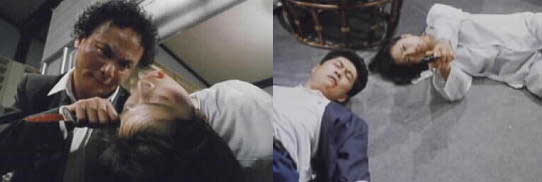 Favorite line (Michiko): “I feel contradiction
itself.”
Favorite line (Michiko): “I feel contradiction
itself.”
A3.5, B3.5, C4, D3, E3, F4 (21). Highly
Recommended
“Raiders of Loesing
Treasure” (aka “Thunder Mission,” 1992)
How can so many ninjas perform so incompetently?
They do, at least, succeed in killing an unarmed attorney alone in his
office. This low budget Taiwanese film manages to pack in more action
sequences than most, yet somehow they mostly fall flat. Compounding
the lack of martial skill are scenes such as that in which Michiko and
her screen half-sister actually pause mid-fight to resolve their family
differences while the action rages around them!
The film’s premise rests on a sexist bet by
three male interior decorators concerning who can date the first woman
they meet. This happens to be Michiko’s character “Annie Wang.”
She appears in slow motion, a vision of loveliness wearing a formal suit,
fully accessorized, with flowing hair. It has been claimed that the
budget for this film was so low that Michiko supplied her own wardrobe.
If so, it’s a testament to her good taste, and one of the better aspects
of the film.
 Annie Wang is the director of a software company
who lives with her mother. Her company becomes the target of a Japanese
terrorist group, played by familiar Taiwanese action actors. It turns
out that Annie’s half-sister “Hsian” is married to “Suzuki” – the Japanese
terrorist mastermind. By the movie’s close, Hsian discovers Suzuki’s
treachery and is reunited with Annie.
Annie Wang is the director of a software company
who lives with her mother. Her company becomes the target of a Japanese
terrorist group, played by familiar Taiwanese action actors. It turns
out that Annie’s half-sister “Hsian” is married to “Suzuki” – the Japanese
terrorist mastermind. By the movie’s close, Hsian discovers Suzuki’s
treachery and is reunited with Annie.
Much of the film is taken up with the mildly
comic antics of one of the interior decorators “Shin” (Alex Fong) who,
encouraged by his adoptive father (Wu Ma), attempts to seduce Annie.
She needs protection from the terrorist attacks, and Shin’s kung fu skills
help save the day and win the girl. Perhaps Annie could have thought
to call the police instead.
Compounding this stereotype is the caricatured
portrayal of Annie’s female assistant, driver and bodyguard “Little Pepper”
as the butt of sexist “humor.” An apparently competent martial arts
performer, she’s also required to endure dating jokes and establish her
toughness by out-drinking the males.
There are nevertheless several solid fight
sequences along the way. Wearing a tight skirt and heels, Michiko
fights off a gang of assailants on a flight of stairs, displaying powerful
punching and kicks as well as impressive gymnastics. Later, Michiko
performs a kip on a car roof. Both women show strong martial arts
moves, but it’s not as fast or spectacular as the best of the genre.
 The various elements – being attacked in the office,
a car fire-bombed, Annie’s mother being killed, a nocturnal raid on an
arms cache – are fair but formulaic. They have been performed too
often in other films. The final fight is predictable and lacking
tension, although Michiko throws some great kicks – noticeably higher than
usual, with some powerful roundhouse and hook kicks. Both she and
her assistant Little Pepper are the ones to watch, and credit is due to
the latter performer – not only for her solid martial arts skills but also
for her ability to generate elements of a screen partnership with Michiko’s
character. No other female actor achieved this.
The various elements – being attacked in the office,
a car fire-bombed, Annie’s mother being killed, a nocturnal raid on an
arms cache – are fair but formulaic. They have been performed too
often in other films. The final fight is predictable and lacking
tension, although Michiko throws some great kicks – noticeably higher than
usual, with some powerful roundhouse and hook kicks. Both she and
her assistant Little Pepper are the ones to watch, and credit is due to
the latter performer – not only for her solid martial arts skills but also
for her ability to generate elements of a screen partnership with Michiko’s
character. No other female actor achieved this.
However, the closing scene sums up the very
conventional nature of this film. Three of the male and three of
the female heroes survive. They immediately pair up.
Favorite line (Suzuki): “Jerks, you can’t
even handle two women.”
A3, B3, C2, D2, E2.5, F2 (14.5). Fight
Scenes

















